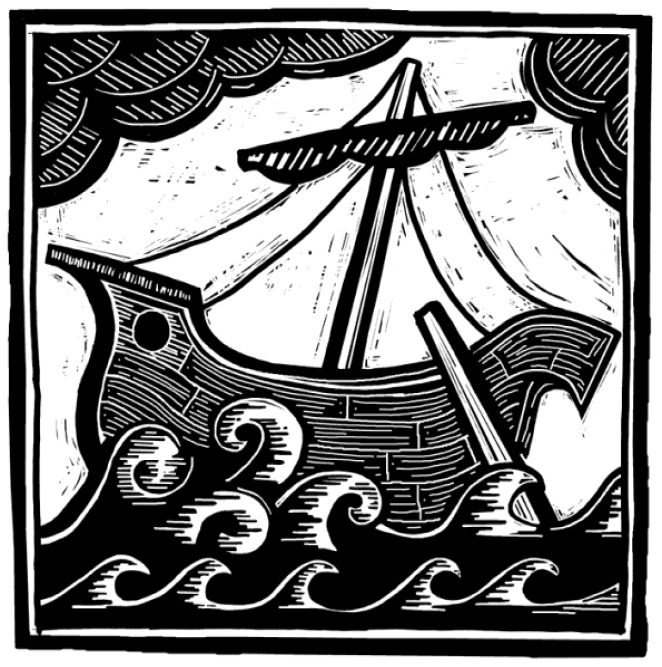It is amazing how quickly we organize our lives to become predictable and routine. A boat is kind of a miniature island on which a society of two people live, leaving it only occasionally for cross-cultural experiences in port.

Every morning now, when the sunlight starts shining through the plexiglass hatch above our berth, about 6:00, I get up, put on some coffee, get out the computer from its place behind the settee, open up the table and begin writing. Between 7:30 and 8:00 I finish, and begin working on the next project on the boat. Janet has breakfast ready usually about 9:30 or 10:00 (we are down to two meals a day) and we plan the rest of the day’s work, dividing tasks and errands, discussing what we need to purchase, or what can wait until later. We must finish all errand running by 12:30 or 1:00 because the shops close down, and will not open again until 5:00 or 6:00. This means, to do a project, you must have all the parts and supplies on hand, or complete it that evening when the shops open up. By mid-afternoon, when the sun is at its hottest, we take a break, have a cold drink, and plan the next steps. At about 7:30 we are usually tired enough to finish up the projects, whether completed or not. Sometimes we take showers on the deck from our little solar heated plastic shower bottle we hang above the deck, then one or both of us goes to the internet café to keep up with the correspondence. Janet prepares dinner and sometime between by 8:00 and 10:00 we are ready to eat, sitting in the cockpit, watching the sun go down, and the people go by. Routine, predictability, order.
All that changed this week. On Thursday evening, when Janet and I checked the email, there was a short message from Drew Davis, the agent handling our documentation from the US Coast Guard, informing us that the documents were finished! Since April we have been working on these documents, first with the Greek authorities, then with the US. We have faxed, emailed, express delivered, notarized, and translated documents from and too all parts of the Mediterranean world and the United States. We have met people who waited 6 months to be able to sail. And while we waited and hoped, our lives became routine and predictable. But when the expected announcement came last week, it surprised us and changed our lives. We are going to be able to sail soon. We will leave the security of Volos; we will lose a little control over our routine and life will become unpredictable.
We are hoping to set sail about Wednesday or Thursday of this week, depending on whether the obligatory insurance coverage is completed and the Greek authorities clear us for leaving port. When this occurs we will sail to the island of Skiathos, about 36 miles from Volos, and from there do our sea trials of SailingActs. On Sunday, Dorothy Scheffel, Janet’s sister and a sailor, will join us and we will work our way towards Samos and begin Paul’s itinerary from there, leaving the southern end of the Mediterranean for late summer and fall on our way toward Israel. At least that is the plan, but like Paul, we know that plans can change drastically.
Like Paul. Our experiences are giving us a whole new appreciation and understanding of Paul the traveler. He too had his life, his world, and his future changed when he met Jesus on the road to Damascus. His conversion not only changed his heart, it changed his itinerary from the familiar to the unknown, from being in control to being at the mercy of others.
A reporter from a local paper in Volos the Thessalia came by on Monday to interview Janet and I, take some photos, and discuss the world. He sat in our boat: “Why did you buy your boat in Volos?” “What gave you the idea to follow Paul?” “How do you like Greece?” The next day, there we are on the front page. Now all the neighboring boat owners, shopkeepers, passersby, know where we are from and what we are up to. They smile and nod, stare or sometimes shake their heads at the couple from America, working on their boat, trying to figure out the ropes of the boat, Greek culture and Paul. Two days later an Athens newspaper called and did an interview by telephone.
The day after the Volos journalist interviewed us, he came by the boat with a paper hot off the press. (Photos) I met up with him again later in the shop of Captain Steve, the seller of the boat, where he is discussing his article. We all discuss Paul. “Why is Paul called an Apostle, even though he was not a disciple of Jesus?” Captain Steve asks. “What does the Greek word ‘apostolos’ mean in English?” I inquire. “Messenger,” someone says. A customer in the shop chimes in. “It also means someone who is sent out specifically by someone else to deliver that message.” Greeks in a shop, discussing Paul’s credentials. I am certain these discussions happened almost the same way in this area almost 2,000 years ago.
Again, I am happy to be on this journey, scared about losing the security of Volos, but happy to be sailing Acts, living with Paul. There is, as you might recognize, a metaphor for the life of faith and mission in the world here. What do you think?
